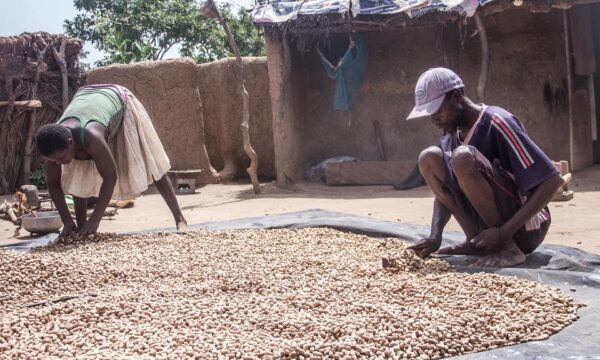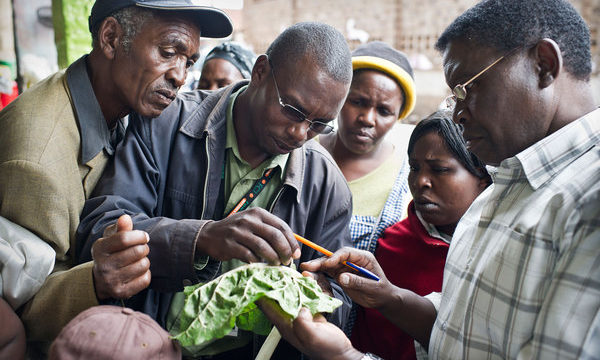By Katie Tomlinson
On the 16th October, World Food Day events will take place around the globe to draw attention to the growing problem of world hunger and malnutrition.

Shockingly, the FAO has reported that 10% of the global population experienced severe food insecurity in 2017 and that world hunger has increased for the third consecutive year. Key drivers in this trend have been recent climate variations and extreme weather events and increasing impacts of pests and diseases.
Plant health has always been tightly linked to human health. There are infamous cases where a decline in plant health has contributed to food shortages and caused severe human suffering. Plant diseases not only reduce the quantity of food plants produce but also the quality of food. For instance, species of Aspergillus fungi produce alfatoxins that contaminate oilseeds, cereals, grains, legumes and tree nuts. Continued exposure to aflatoxins in contaminated food can lead to liver cancer, immune suppression and stunted growth in children. The fungus grows particularly well in warm, humid climates common to areas of sub-Saharan Africa. A study has shown high levels of alfatoxin contamination on grains and nuts in central Tanzania and in the Iringa, Tabora, and Kilimanjaro regions, 67% of children were reported to have ingested relatively high levels of alfatoxins. Interventions, such as training farmers in the dangers of alfatoxins to human health and the benefits of drying grains can significantly help to reduce the damage caused by the fungus.
Global plant health is now under threat from a multitude of pests and diseases, which are introduced to new areas through the global trade of plants and can rapidly adapt to favorable climate changes. Examples of emerging threats to plant health include Xanthomonas Wilt of Banana, a bacterial disease which is threatening the food security of about 70 million people in sub-Saharan Africa and the Puccinia graminis f. sp. tritici fungus which is having a devastating impact on wheat in Uganda, and is also threatening most of the wheat-growing countries of the world. These threats to plant health directly affect human health.
- Infected banana with wilted and yellowed young and older leaves
- Oozing of creamy to yellow bacterial fluid from inside the banane
- Premature ripening of fruit which will rot due to bacterial infection
To tackle global hunger, the UN launched the Zero Hunger Challenge in 2012, which aims to eliminate all forms of malnutrition and build inclusive, sustainable food systems. This has called for renewed focus to improve responses to food crises, building capacity and resilience and long-term proactive strategies. Through pledging to be a part of the Zero Hunger campaign, 57 countries have implemented measures to prevent and reduce food insecurity risks. Although promising, this progress needs to be scaled up, with increased investment and policy coherence if the goal of ending world hunger by 2030 is to be achieved. World Food Day on the 16th October is driving social and political momentum and attracting attention to the world hunger problem. Events are taking place in around 130 countries and include marathons, hunger marches, exhibitions, cultural performances and concerts. You can take part by attending a World Food Day event and pledge your support for the Zero Hunger campaign.
Read more:
- The State of Food Security and Nutrition in the World
- Plant health and food security
- Improving food security through plant health
About the author
Katie Tomlinson has recently finished her PhD and is about to start a post-doc at the University of Bristol, UK where she will be researching Cassava brown streak virus transmission with Dr. Andy Bailey and Prof. Gary Foster. Her project is funded by the Connected Community Network for African Vector-Borne Plant Viruses, which is part of the UK government Global Challenges Research Fund. You can read her first-hand experiences of how cassava viruses affect plant health in Uganda in her blogposts for the Cabot Institute.
2 Comments
Leave a Reply
Related News & Blogs
PlantwisePlus – supporting countries with pest preparedness for food security
On World Food Day, CABI’s Global Lead for Pest Preparedness, Dr Ivan Rwomushana, considers how pest preparedness can safeguard ‘foods for a better life and a better future’ helping smallholder farmers to access the knowledge they need to prepare for an…
16 October 2024







[…] Plant health key to reducing world hunger […]
[…] 8. Plant health key to reducing world hunger (October) […]